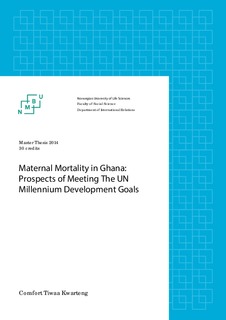| dc.description.abstract | Maternal health has received continuous attention at the global, national and the local levels over several decades. During the UN Millennium Summit in the year 2000, the UN member states including Ghana adopted eight (8) Millennium Development Goals (MDGs) which are geared towards improving the life of all people across the globe. Improving maternal health became the MDG 5 with two (2) specific targets to be achieved by 2015. In Ghana, the overall pace of progress in maternal health is not encouraging and may likely not meet the MDG 5. This study explores the reasons that account for the slow improvement of maternal health in Ghana towards achieving the goal of MDG 5. The study will serve as a relevant information for policymakers to come out with health policy reforms that will address issues related to maternal mortality.
The study employed qualitative research approach with a case study design, conducted in Asante Akim Central Municipality (AACM). Purposive sample technique was used which involved pregnant women, midwives, Physician assistant (PA), health personnel, Municipal
Health Directorate (MHD), Municipal Development Planning Coordinator (MDPC) and representatives of NGOs. These entities were as key informants. However, pregnant women were used in the focus group discussions. Secondary data included research conducted, policy documents and articles related to the research interest area. The gender and power theory by Connell and the gender of power by Davis et al will form the foundation of this study. It was found that most pregnant women residing in the rural areas have difficulty in accessing skilled health care. They are unable to enrol in the National Health Insurance Scheme (NHIS) and those who are already enrolled find it difficult to renew their insurance cards when they
expire due to financial constraints. This group of women fail to attend antenatal care (ANC) regularly which makes it difficult for them to receive education on their health. Moreover, they are not able to detect pregnancy related complications due to the inadequate education and most of them depend on TBAs who sometimes do not handle complications efficiently. It was also found that Inadequate number of health personnel and the refusal on their part to accept postings to the rural areas of the municipality does not allow the steady improvement of maternal health in the municipality. Moreover, the laid down structures and allocation of resources by the government are not adequate enough to make significant improvement in
maternal health. | nb_NO |
